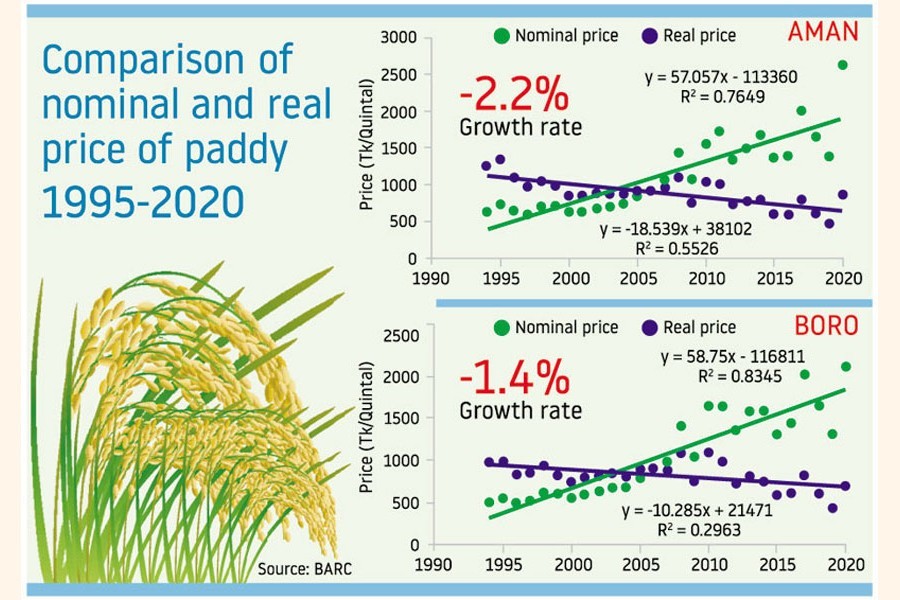
Published :
Updated :

Rice production has largely become a losing agro-venture for the country's peasantry for the past two and a half decades, according to a latest official study.
Real effective prices of both paddy and rice declined by around 2.0-3.0 per cent during every harvesting seasons of Aman and Boro seasons since 1995, the study noted.
The Bangladesh Agricultural Research Council (BARC) study also said production costs have been increasing annually by 3.0 per cent on average since 2009.
Farmers' net profits declined by 8.0 per cent per annum during the period.
On the other hand, millers earned a profit between Tk 4.6 and Tk. 9.5 a kilogram, including their gains from rice by-products, in recent years.
The study styled 'Availability and Price Volatility of Rice in Bangladesh: An Inter-Institutional Study in 2020' was published at a programme organised by the BARC recently
The BARC hosted the event to reveal studies on the cause of escalations in the prices of rice, onion and potato in 2020.
Taking into account the link between the marketed 'surplus' and the 'price', the report on rice observed that certain quarters do enjoy the power to regulate price of the main staple, not the ' demand and supply'.
"Price spread reveals that mid-level actors, particularly millers, aratdars and wholesalers, harvested excessive profits," the BARC observed.
The study was done involving agencies concerned under agriculture, food, planning and commerce ministries and Bangladesh Agricultural University.
Agricultural economic division of the Bangladesh Rice Research Institute (BRRI) under agriculture ministry led the research.
Team member and BRRI senior scientific officer Dr Md Chhiddikur Rahman said farmers were forced to sell 75-77 per cent of their crops within the first two months of the harvesting seasons of Boro rice in 2019 and 2020.
Farmers' inability to keep paddy for a certain period helps middlemen take control of the market, he told the FE.
Mr Rahman said they suggested raising domestic procurement of rice to 2.5-million tonnes in a season while monthly government stock of the staple should always be at least 1.25-million tonnes.
Such government intervention can ensure an equilibrium in the market, he added.
Dr Md Asaduzzaman, former research director of the Bangladesh Institute of Development Studies, said both paddy and rice markets are dominated by big millers.
Failure of the government to procure a notable quantity of rice production has helped the millers to exercise their total control over the market, thus depriving both farmers and consumers, he told the FE.
"Farmers are being deprived of profits while consumers being forced to pay higher prices despite having enough supply and low prices during the harvest time."
He said farmers in the last Boro season have got Tk 650-850 a maund for different paddy varieties in April-June period when prices rose to Tk 1,100-1,350 in August-October 2020.
Mr Asaduzzaman said the country's marketing network being very poor have been failing to protect the interests of the farmers.
Bangladesh should build community-based storage like that of Thailand and India to bring a change in farmers' livelihood and to check any market volatility, he suggested.
When asked, value-chain expert and agri-economist Prof Golam Hafeez Kennedy said more than 46-per cent farmers of the country are landless.
They are the most vulnerable section in a volatile market, he observed.
Mr Kennedy said minimum support price (MSP) should be made a legal right for the farmers to help them gain the minimum profits.
He also pointed out that the farmers, who have less than 33 decimals of land, can hardly get any bank loan.
Formal loan should be available for poor farmers during harvesting season so that they can get some time to keep their produce for a bargain later, Mr Kennedy.
Bangladesh is the third-largest rice producer in the world with more than 36-million tonnes of production.
Above 16-million farm households are involved in rice cultivation here, according to the Bangladesh Bureau of Statistics.


 For all latest news, follow The Financial Express Google News channel.
For all latest news, follow The Financial Express Google News channel.